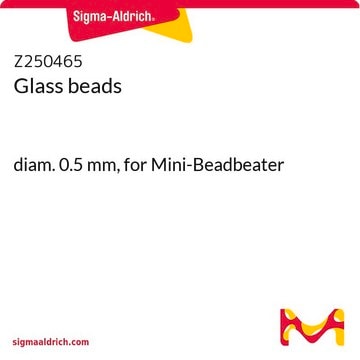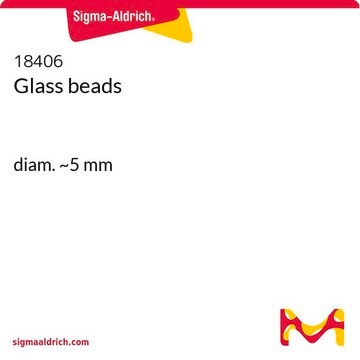G9143
Glass beads, unwashed
212-300 μm (50-70 U.S. sieve)
Synonyme(s) :
Raw Glass Beads
Se connecterpour consulter vos tarifs contractuels et ceux de votre entreprise/organisme
About This Item
Code UNSPSC :
41100000
Nomenclature NACRES :
NB.22
Produits recommandés
Taille des particules
212-300 μm (50-70 U.S. sieve)
Application
Unwashed glass beads have been used for the extraction of DNA from Fonsecaea sp.
Code de la classe de stockage
11 - Combustible Solids
Classe de danger pour l'eau (WGK)
WGK 3
Point d'éclair (°F)
Not applicable
Point d'éclair (°C)
Not applicable
Équipement de protection individuelle
Eyeshields, Gloves, type N95 (US)
Certificats d'analyse (COA)
Recherchez un Certificats d'analyse (COA) en saisissant le numéro de lot du produit. Les numéros de lot figurent sur l'étiquette du produit après les mots "Lot" ou "Batch".
Déjà en possession de ce produit ?
Retrouvez la documentation relative aux produits que vous avez récemment achetés dans la Bibliothèque de documents.
Les clients ont également consulté
Anamangadan Shafeeq Hassan et al.
Medical mycology, 54(3), 287-294 (2015-12-27)
Fusarium species are reported frequently as the most common causative agents of fungal keratitis in tropical countries such as India. Sixty-five fusaria isolated from patients were subjected to multilocus DNA sequencing to characterize the spectrum of the species associated with
M J Najafzadeh et al.
Microbial pathogenesis, 125, 43-47 (2018-09-09)
Chromoblastomycosis is one of the most prevalent implantation fungal infections caused by melanized fungi, affecting individuals with certain risk factors with high morbidity due to its recalcitrant nature. It is difficult to identify the etiological agents and thus a suitable
M J Najafzadeh et al.
Mycopathologia, 183(4), 669-677 (2018-03-06)
The black yeast genus Exophiala includes numerous potential opportunistic species that potentially cause systematic and disseminated infections in immunocompetent individuals. Species causing systemic disease have ability to grow at 37-40 °C, while others consistently lack thermotolerance and are involved in diseases
Mohammad Javad Najafzadeh et al.
Emerging infectious diseases, 17(3), 464-469 (2011-03-12)
To assess population diversities among 81 strains of fungi in the genus Fonsecaea that had been identified down to species level, we applied amplified fragment-length polymorphism (AFLP) technology and sequenced the internal transcribed spacer regions and the partial cell division
Jalila Mohsin et al.
Mycoses, 60(9), 569-575 (2017-07-08)
Candida auris has been recognised as a problematic healthcare-associated emerging yeast which is often misidentified as Candida haemulonii by commercial systems. Correct early identification of C. auris is important for appropriate antifungal treatment and implementing effective infection control measures. Here we
Notre équipe de scientifiques dispose d'une expérience dans tous les secteurs de la recherche, notamment en sciences de la vie, science des matériaux, synthèse chimique, chromatographie, analyse et dans de nombreux autres domaines..
Contacter notre Service technique












